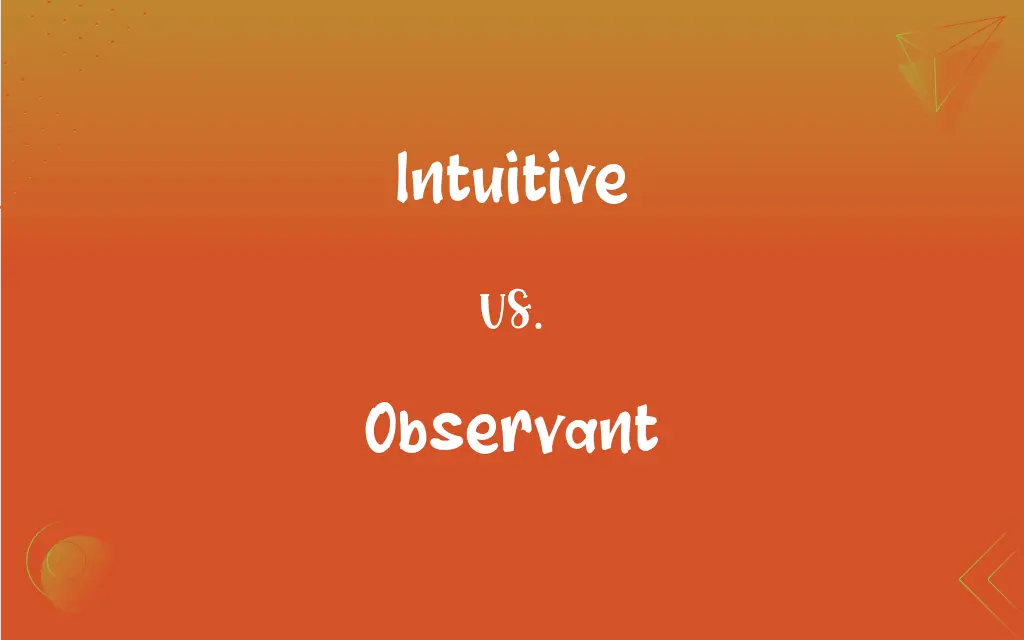Intuitive vs. Observant: What's the Difference?
Edited by Aimie Carlson || By Janet White || Updated on December 11, 2023
Intuitive refers to relying on instinct or an inner sense, while observant means being attentive or alert to the external environment.

Key Differences
Intuitive individuals often rely on their gut feelings or instincts to understand and interact with the world. In contrast, observant people pay close attention to details and external stimuli, analyzing their surroundings carefully.
Intuitive thinking leads to conclusions based on internal perceptions, often without concrete evidence, while observant thinking bases conclusions on careful scrutiny of external facts and details.
Intuition often involves a leap in logic or understanding without a clear, step-by-step process. Observant individuals, however, follow a logical and methodical approach, piecing together information gathered from their environment.
Those who are intuitive may excel in creative and abstract thinking, making connections that are not immediately apparent. Conversely, observant individuals excel in situations requiring detailed analysis and factual accuracy.
Intuitive people might process information based on a subjective internal framework, often influenced by emotions. Observant people, on the other hand, tend to be more objective, basing their understanding on observable and measurable data.
ADVERTISEMENT
Comparison Chart
Comparison
Intuitive
Observant
Decision Making
Based on gut feelings
Based on detailed observation
Problem Solving
Leaps to solutions intuitively
Analyzes problems step by step
Learning Style
Prefers abstract concepts
Prefers concrete facts
Focus
Inward, on internal thoughts
Outward, on external details
ADVERTISEMENT
Approach to Information
Holistic, big picture
Methodical, detail-oriented
Intuitive and Observant Definitions
Intuitive
Relating to instinctive understanding without conscious reasoning.
She had an intuitive sense that something was not right.
Observant
Keen in the observation of outward things.
Her observant nature helped her excel in her role as a journalist.
Intuitive
Perceived by, resulting from, or involving intuition.
The artist's intuitive choice of colors amazed everyone.
Observant
Observing or watching closely.
The observant detective gathered significant clues from the crime scene.
Intuitive
Having the ability to understand or know something without any direct evidence or reasoning process.
His intuitive approach to business often led to successful outcomes.
Observant
Quick to notice or perceive things.
He was observant of the changes in his friend's behavior.
Intuitive
Having or possessing intuition.
Her intuitive response to the crisis saved the day.
Observant
Paying careful attention to the physical world.
The observant hiker spotted the rare bird in the forest.
Intuitive
Characterized by intuition.
He solved the puzzle through an intuitive understanding of its pattern.
Observant
Attentive to or quick to notice details.
As an observant teacher, she noticed her student's struggle with the lesson.
Intuitive
Of, relating to, or arising from intuition
"The greatest scientific thinkers are those who rely on sudden intuitive flashes to solve problems" (Andrew Weil).
Observant
Having or showing keen perceptiveness; perceptive
An observant traveler.
An observant memoir.
Intuitive
Possessing or demonstrating intuition
An intuitive thinker.
Observant
Diligent in observing a law, custom, duty, or principle
Observant of the speed limit.
FAQs
Is intuition always correct?
Intuition is not always correct; it's a subjective feeling and can be influenced by personal biases.
What is intuition?
Intuition is the ability to understand something instinctively, without the need for conscious reasoning.
How do observant people process information?
Observant people process information by paying close attention to details and their surroundings.
What are the benefits of being observant?
Being observant helps in accurately assessing situations, making informed decisions, and noticing details that others might miss.
How do intuitive decisions differ from analytical ones?
Intuitive decisions are often faster and based on gut feelings, while analytical decisions are slower and based on data and logical reasoning.
Is being observant important in relationships?
Yes, being observant is important in relationships as it helps in understanding and responding to the needs and emotions of others.
Can intuition be misleading?
Intuition can sometimes be misleading, especially if it is based on incomplete information or personal biases.
Can intuition be developed?
Intuition can be developed by trusting and paying attention to one's inner feelings and experiences.
Can someone be both intuitive and observant?
Yes, it's possible for a person to exhibit both intuitive and observant traits.
Do intuitive people rely on logic?
Intuitive people may use logic, but they often rely more on their internal sense or gut feelings.
Is being observant a learned skill?
Observant skills can be improved with practice, although some people may naturally be more observant than others.
How does intuition play a role in creativity?
Intuition can lead to creative insights by connecting ideas in novel ways, often bypassing linear thinking.
Are observant people better at remembering details?
Yes, observant people often have a keen ability to remember details because they pay close attention to their environment.
Is being observant critical in decision-making?
Being observant can enhance decision-making by providing a comprehensive understanding of the situation at hand.
What professions benefit from being observant?
Professions like detective work, journalism, science, and education benefit greatly from being observant.
How can one improve their observational skills?
Observational skills can be improved by practicing mindfulness, paying attention to details, and actively engaging with one's environment.
How do cultural backgrounds influence intuition?
Cultural backgrounds can influence intuition by shaping one's experiences, beliefs, and values, which in turn affect how intuition is experienced and interpreted.
Do children exhibit intuitive or observant traits more?
Children can exhibit both intuitive and observant traits, and these can develop differently as they grow.
What role does observation play in learning?
Observation plays a crucial role in learning by allowing individuals to gather information, understand patterns, and apply learned knowledge.
Are intuitive people more emotional?
Intuitive people may be more in tune with their emotions, but this doesn't necessarily mean they are more emotional.
About Author
Written by
Janet WhiteJanet White has been an esteemed writer and blogger for Difference Wiki. Holding a Master's degree in Science and Medical Journalism from the prestigious Boston University, she has consistently demonstrated her expertise and passion for her field. When she's not immersed in her work, Janet relishes her time exercising, delving into a good book, and cherishing moments with friends and family.
Edited by
Aimie CarlsonAimie Carlson, holding a master's degree in English literature, is a fervent English language enthusiast. She lends her writing talents to Difference Wiki, a prominent website that specializes in comparisons, offering readers insightful analyses that both captivate and inform.































































